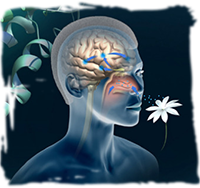 The smell of bread baking in the oven … the scent of a summer barbeque … the smell of freshly cut grass … catching the waft of a rose garden as you walk by …
The smell of bread baking in the oven … the scent of a summer barbeque … the smell of freshly cut grass … catching the waft of a rose garden as you walk by …
Familiar and favorite smells bring forward strong memories, without our active participation. Our sense of smell completely by-passes our conscious thought mechanism and travels directly to our limbic system.
Smell is our strongest sense! The human nose can detect up to 10,000 different odors at infinitesimal concentrations. For example, vanilla can be detected at a concentration level of .00000000762 particles per cubic inch. Our sense of smell is so powerful, physiological effects take place simply by inhaling an essential oil.
Aromatherapy is considered a psychosomatic treatment because it works on the physical, emotional and mental levels. Psycho-aromatherapy focuses on the psychological potential of essential oils, primarily the effects of fragrance. It has been found that psycho-therapeutic results can be obtained more easily and quickly through smell than any other method.
Through psycho-aromatherapy we can achieve not only an emotional/psychological reaction or experience, but also a significant physiological effect on the nervous system by using these essences. This is known as a psychosomatic experience and begins with olfaction.
Olfaction
Olfaction is the process of smelling. When we smell a flower, it involves the olfactory system. The fragrance of a flower is made up of minute aromatic molecules, each with their own specific shape. This fragrance enters our nose with our breath. The olfactory epithelium is located at the top and both sides of the upper nasal cavity. This epithelium is covered with a thin layer of mucus, and these aromatic molecules get through the mucus to the underlying tissue of about 10 million olfactory nerve cells.
Each nerve cell carries many tiny hairs called cilia that come equipped with different receptor cells to fit each and every aromatic molecule shape. These receptor cells carry vast amounts of information and they transmit this odor information to the olfactory bulb, which in turn passes the message on to the olfactory cortex as an electrical impulse. This message then goes to the limbic system, which is another grouping of structures in itself. The limbic system consists of the thalamus, hypothalamus, neocortex, pituitary gland, amygdala and hippocampus.
The limbic system holds the key for our high explosive inner life; the core of our being, our sexuality, impulses of attraction and/or aversion, motivation, moods, memory and creativity. For example, the scent of a rose goes directly to the limbic system where past memories associated with the fragrance are immediately evoked. This information is then translated into physiological and behavioral effects and finally into a conscious olfactory experience.
The limbic system also orchestrates the complex nervous and hormonal activities via the hypothalamus. Emotional or instinctual reactions registered by the limbic system are translated into physical responses like “fight or flight”, sexual impulses, expressions of pleasure, etc. Certain scents can even regulate the autonomic nervous system. These scents can bring about rapid heartbeat, changes in breathing and changes in the digestive process.
Visual and oral stimuli are processed by the cerebral cortex. Odors however, pass straight to the olfactory bulb where they give an immediate “feeling” value. This is why we can be affected by odors without even being conscious of the fact. The information has bypassed the cerebral cortex and headed straight for the innermost “control centers” of the limbic system.
Now that the limbic system has picked up these molecules they continue their journey to the lungs where they pass through the alveoli and into the blood capillaries. Once in the capillaries they are carried through the circulatory system where they have access to all the organs and systems of the body.
Never underestimate the power of our sense of smell. We are born with a functioning olfactory system whereas the auditory and visual systems take a few more months to develop. There are studies that show a direct link between the development of the nose and brain. In the early 1980’s, a biologist named Pasquale Graziadei observed that the forebrain literally develops under the influence of the nose. For instance, babies born with anecephaly (without a brain), also lack a nose.
There are also studies that have shown infants less than 2 weeks old, orient themselves towards maternal odors. Odor plays a very important role here as this means survival for the infant as well as security and comfort.
Did you know…
We all have our own ‘odor-print’ or ‘olfactory fingerprint’. This is a very distinctive signature of personal identity which is produced in special sweat glands called apocrine sweat glands. The odor these sweat glands secrete has a musky scent. Research studies are ongoing in this area as it is believed to be the ‘essence’ of attraction and / or compatibility in relationships. So far conclusions have shown that you cannot have an intimate relationship with someone whose odor you don’t like. This is not in reference to their cologne or perfume, but their own distinctive scent that we pick up subconsciously more than consciously.
If you appreciate the information provided,
please help keep this website running. Blessings!
© 2008-2025 aromaworx.ca. All rights reserved.

